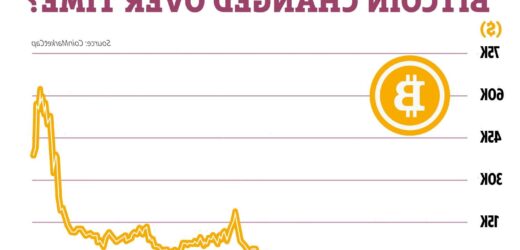BITCOIN is one of the oldest and most popular cryptocurrencies, but has experienced wild price swings since its creation in 2009.
It soared to a record-breaking high of $64,536 in April, but nearly halved in value within the space of six weeks to $36,664.
🔵 Read our cryptocurrency live blog for the latest Bitcoin updates
Experts have warned that the future of Bitcoin remains “highly unpredictable”, with more rollercoaster highs and lows to be expected.
But if you’re thinking about investing in Bitcoin or any other cryptocurrency, be warned: buying cryptocurrencies is a very risky business.
Investing is not a guaranteed way to make money – so make sure you know the risks and can afford to lose money.
Cryptocurrencies are highly volatile, so while your cash can go up, it can just as easily go down in the blink of an eye.
Experts have also raised concerns about the legitimacy of some tokens, as well as scams associated with cryptocurrencies.
As always, you shouldn’t invest in something you don’t understand.
Here’s what you need to know about Bitcoin’s dramatic price rises and falls.
When was Bitcoin created?
Bitcoin is a virtual currency that was created in 2009 by an unknown computer whizz using the alias Satoshi Nakamoto.
Unlike physical currencies such as pounds, dollars or euros, which come in physical notes and coins, Bitcoin isn't printed or minted.
5 risks of crypto investments
THE Financial Conduct Authority (FCA) has warned people about the risks of investing in cryptocurrencies.
- Consumer protection: Some investments advertising high returns based on cryptoassets may not be subject to regulation beyond anti-money laundering requirements.
- Price volatility: Significant price volatility in cryptoassets, combined with the inherent difficulties of valuing cryptoassets reliably, places consumers at a high risk of losses.
- Product complexity: The complexity of some products and services relating to cryptoassets can make it hard for consumers to understand the risks. There is no guarantee that cryptoassets can be converted back into cash. Converting a cryptoasset back to cash depends on demand and supply existing in the market.
- Charges and fees: Consumers should consider the impact of fees and charges on their investment which may be more than those for regulated investment products.
- Marketing materials: Firms may overstate the returns of products or understate the risks involved.
Instead, Bitcoin tokens are a digital-only form of payment and are created by a computer code.
If you have invested in Bitcoin, you can set up a virtual wallet to store, keep track and spend your digital money.
You are also able to purchase Bitcoin through an online exchange or Bitcoin ATM – but not all businesses accept Bitcoin as a form of payment.
You can use the Where To Spend Bitcoin UK website to find merchants that accept the currency.
How has its price changed?
The value of Bitcoin first started to dramatically pick up around mid-2017.
It was hovering around the $1,100 mark at the beginning of the year and surged to $17,381 on December 2 – a whopping 1,480% increase.
According to Coindesk, it was this year that Bitcoin caught the eye of Wall Street heavyweights including Goldman Sachs, who began to monitor and forecast its price.
But the coin couldn’t keep up it’s surge as it entered the new year, tumbling over the course of 2018 to around $3700 towards the end of December.
Experts gave a number of explanations for Bitcoin’s fall, from trading bots triggering a wave of quick sells and buys to even blaming the moon for its drop.
Some thought the coin would never recover, calling it a “failed experiment” – but by mid-2019, trading had heated up once more, with the value of Bitcoin pushing up to a seven month high of $11,888 in August.
But it was over the course of 2020 that saw Bitcoin’s fortunes turn despite the Covid crisis, soaring to a three year high of $19,689 in November, which climbed further by the end of the year to $28,847.
It came following a major backing from Paypal, who added Bitcoin to its service for users in the UK.
The hype continued into this year, and by April, Bitcoin had spiked to an all time high of $64,536.
But it’s record breaking gains quickly crumbled, and over just six weeks, the value of Bitcoin has halved to $36,664.
It followed a series of hammer blows to the crypto currency, with celebrity backer Elon Musk announcing a dramatic u-turn in favour towards the coin.
He announced Tesla would no longer accept Bitcoin due to the company’s concerns about the harmful effects that mining the cryptocurrency has on the environment.
The tumble was fuelled further by last week’s news that China has banned banks from providing services related to cryptocurrency transactions.
What is Bitcoin?
BITCOIN got you baffled? Here’s what you need to know:
- Bitcoin is a virtual currency
- It's traded between people without the help of a bank
- Every transaction is recorded in a public ledger, or "blockchain"
- Bitcoin is created by mining
- Mining involves solving difficult maths problems using computer processors
- Bitcoin can be traded anonymously, which can make it a popular way of funding illegal activities
- The value of Bitcoin fluctuates wildly
- Bitcoin is one of many different cryptocurrencies, but by far the most popular
Iran today announced its own crackdown on Bitcoin, banning mining for four months after a series of blackouts left major cities in the dark.
What could happen to its price in the future?
Bitcoin – like all other cryptocurrencies – is highly volatile, so while it may be down currently, it is possible that it could bounce back.
But its sudden price swings mean that you could lose your money in the blink of an eye.
Hargreaves Lansdown senior investment and markets analyst Susannah Streeter said its “almost impossible” to make a call on what will happen to the price of Bitcoin in the future.
She said: “A lot of money from a lot of big companies has been invested in different cryptocurrencies, and we’re even starting to see governments considering establishing their own digital currencies.
“Given the interest, it would seem that as a concept, crypto assets could be here to stay, but we just don’t know exactly what the future will look like.”
DeVere Groupchief executive and founder Nigel Green said Bitcoin will remain a volatile coin until the cryptocurrency market as a whole matures.
“This is because it is a young market based around new and evolving technologies,” he said.
AJ Bell financial analyst Laith Khalef agreed, and said the future of Bitcoin remains “highly unpredictable”.
He said: “It could gain traction as a means of payment, or as a store of value, but it needs to jump through numerous hoops before it gets there, not least addressing environmental and regulatory concerns.
“But equally it could prove to be a dead end in the evolution of the digital economy.”
Why is the cryptocurrency market down today? We explain.
From Dogecoin and Litecoin to Bitcoin – here are the different cryptocurrencies explained.
Mastercard will allow payments in cryptocurrencies like Bitcoin later this year.
Source: Read Full Article



